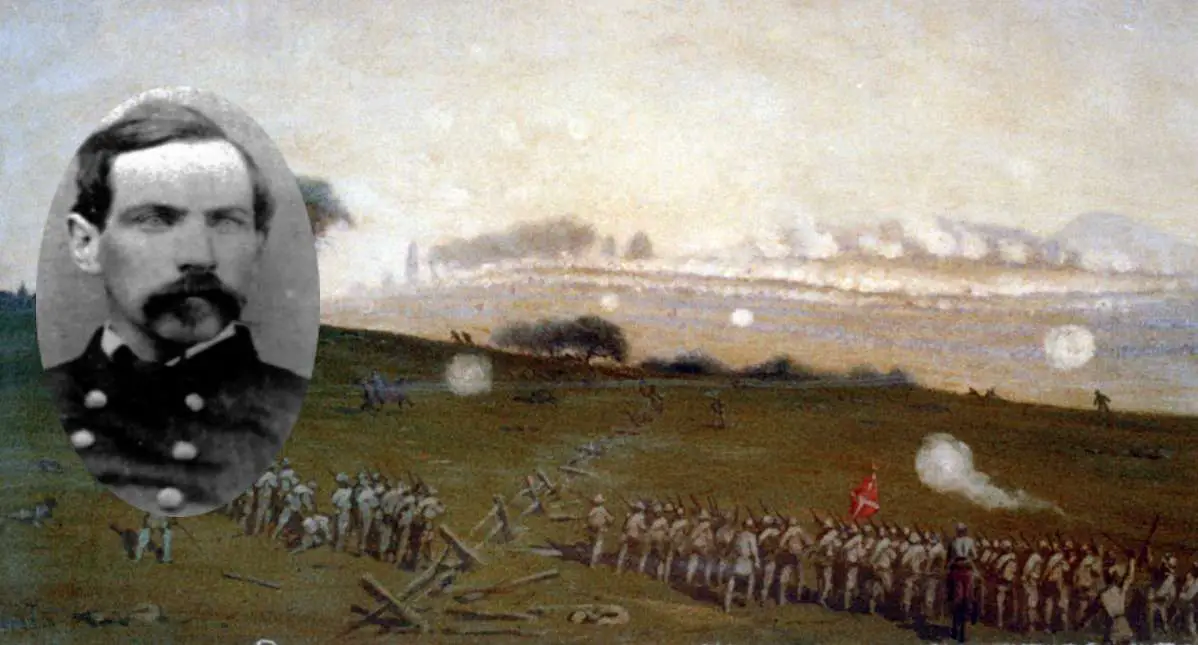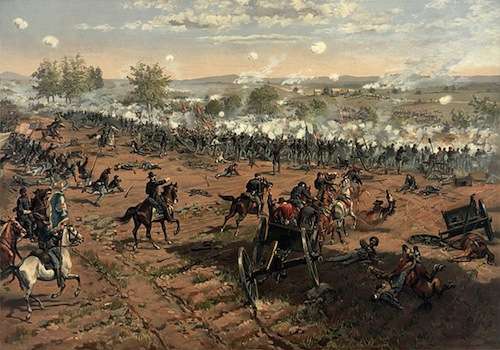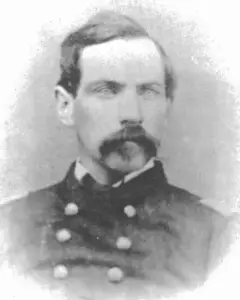Lt. Col. Wheelock Veazey and his 16th Vermont Regiment faced many dangers during the Battle of Gettysburg, not the least of which was falling asleep as artillery fire thundered overhead.
Veazey received the Medal of Honor for his gallant leadership of the 16th Vermont during the battle. The regiment’s fame continues to this day for repelling Pickett’s Charge.
The Vermonters, wrote historian G.G. Benedict, “blasted Pickett’s right flank to smithereens.”
The Most Important Day
Wheelock Veazey was born Dec. 5, 1835, in Brentwood, N.H., the 10th child of Jonathan Veazey, Jr., and Anne Stevens Veazey. The family moved to Exeter, N.H., in 1842. He attended Phillips Academy and, later, Dartmouth College. He was a good student but a prankster who was frequently disciplined. Once he painted a portrait of Satan above the pulpit at the college chapel. After graduation he attended Albany Law School for a year and won admission to the Vermont bar.
When war broke out, he left his infant law practice in Springfield, Vt., to enlist. On April 22, 1861, he wrote in his diary,
This is probably the most important day of my life. May God bless our efforts & the Cause.
Before his regiment left for the front, he took time out to marry Julia Beard, daughter of Albin Beard, owner of the Nashua Telegraph. “She seems perfect to me,” he wrote.
Eight days after arriving in Virginia, then-Capt. Veazey fought in a skirmish in Lewinsville, Va. He was quickly noticed as a spirited and capable commander whose regiment had complete confidence in him.
He served on the court martial board that ordered the execution of the Sleeping Sentinel, later pardoned by President Abraham Lincoln.
Four months after enlisting as a private, Veazey was promoted to lieutenant colonel and helped form the 16th Vermont Regiment.
‘The Majority Fell Asleep’
He had complained about his troops’ and his own lack of sleep in a letter to his wife. On the third day of the Battle of Gettysburg that, apparently, caught up with them. The rebels opened the fighting that day with a massive bombardment from 140 artillery pieces. Wrote Veazey,
My men were lying flat down, and most of the fire with that of our own artillery which was on the crest in our rear passed over us. I lost several men, however, by it. This continued about 2 hours. The effect of this cannonading on my men was the most remarkable ever witnessed in any battle, many of them, I think, the majority fell asleep. It was with the greatest effort only that I could keep awake myself, not withstanding the cries of my wounded men & my anxiety for the more fearful scene which I knew must speedily follow.
That fearful scene was Pickett’s Charge, an infantry charge ordered by Gen. Robert E. Lee against Union troops holding a position on Cemetery Ridge. Then all of a sudden the artillery fire slackened.
Pickett’s Charge
Veazey’s friend Lt. Joseph Goulding described what happened next:
There is a portentious hush and some one with a glass at his eye says: ‘there they come,’ and just emerging from the rebel lines you can see the long ranks of gray, the shimmer of steel in the July sun as their bayonets glitter above their heads. They are sweeping grandly on and on as they come toward us down the slope. They are in three divisions with a front of about a thousand yards but looking far longer in this smoky air.
The Union soldiers fired, and shot and shell tore through their lines, but they closed quickly and kept coming, he wrote.
Their batteries behind them open again over their heads and again the air seems filled with all that kills. They are headed straight for that part of the line where the Vermonters are still hugging the ground and out of sight from the foe who quite naturally suppose them destroyed or paralyzed by the heavy fire to which they have been subjected. Now the gray ranks are almost upon us, their fringe of skirmishers engage ours but are momentarily repulsed while still the heavy charging column comes on nearer and yet nearer. Now within rifle range, their tossing flags wave with their rapid motion as they hurry toward their goal.
See the Vermonters Go At It
Just then, the long lines of the Thirteenth, Fourteenth and Sixteenth Vermont regiments rose from the earth and poured a deadly volley into the enemy’s closed ranks, wrote Goulding.
They stagger and break and surge off to the right as they meet it and so expose their flank and out upon that flank changing front forward under the storm of lead as if on parade, Veazey swings the Sixteenth on the left of the Thirteenth…and firing as they advance, pours most terrible and destructive volleys into Pickett’s dense column which seems to fairly wither and shrivel under them and this unexpected onslaught.
Major Gen. Abner Doubleday waved his hat and shouted, “Glory to God, glory to God, see the Vermonters go at it.”
Afterward, a captured Confederate soldier said he was never more confident of victory as they marched over the field. “But when I saw that Damn Vermont Colonel on foot, hat off, sword swinging in the air in front of his men and cheering them on upon our flank, I knew we were doomed.”
Wheelock Veazey, Medeal of Honor
Wheelock Veazey won the nation’s highest military honor, the Medal of Honor, for his bravery in battle.
He was mustered out on Aug. 10, 1863, in failing health. Once he recovered, Veazey led an illustrious career as Vermont state senator, judge and member of the Interstate Commerce Commission.
Wheelock Veazey died March 22, 1898.
With thanks to Pickett’s Charge: Eyewitness Accounts at the Battle of Gettysburg, edited by Richard Rollins, and Wheelock Graves Veazey, by David F. Cross for the Rutland Historical Society. This story updated in 2022.



3 comments
[…] General,” Cross said. “This is my last battle.” He was mortally wounded that day at the Battle of Gettysburg and died in a field hospital on July 3, […]
[…] blow. The poet was a staunch abolitionist, but he, like the entire country, was troubled by the Civil War. His son Charley in March of 1863 had decided that, regardless of his father's wishes, he would […]
[…] told of the misery and tragic cost of the Gettysburg battle but stressed that there remained hope for the […]
Comments are closed.